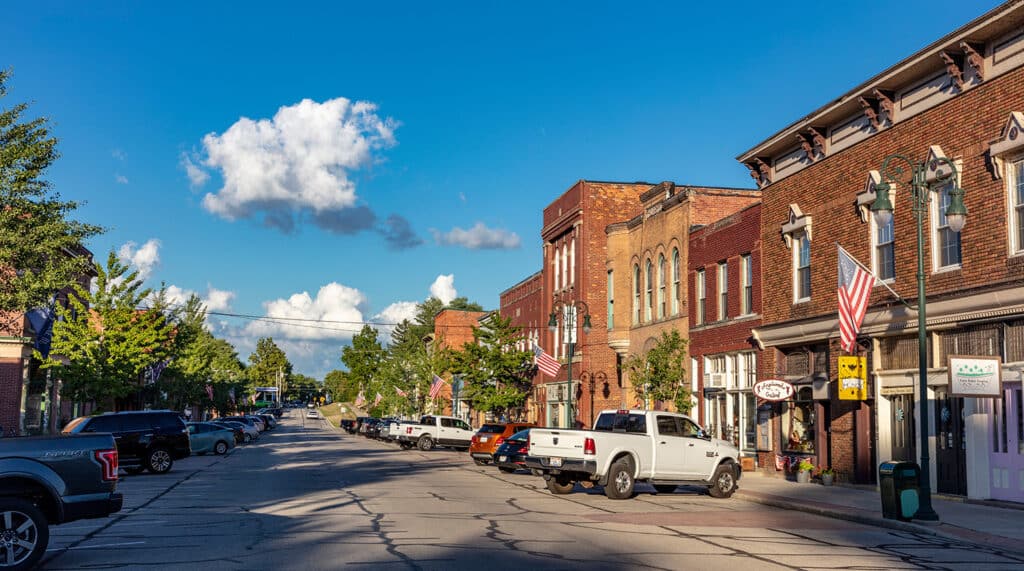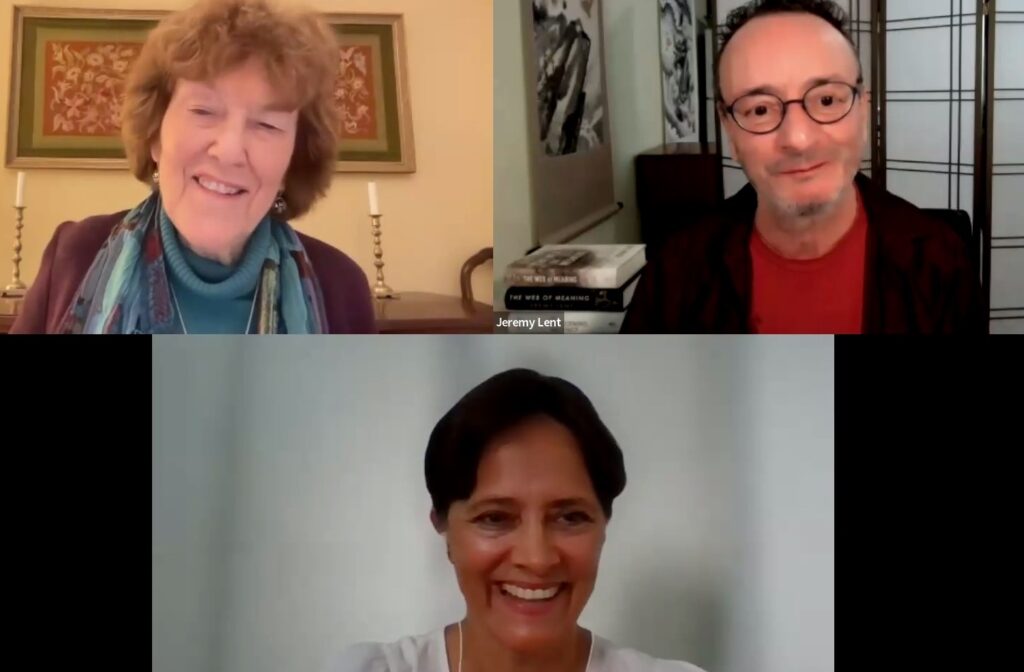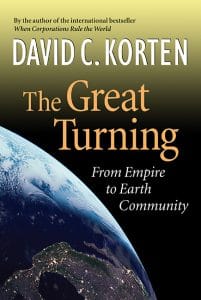January 31, 2023
Dear Friends,
A few weeks ago, I joined a webinar discussion of the Earth Charter and its history, hosted by the Deep Tranformation Network. It was led by Jeremy Lent and featured Mirian Vilela, Executive Director of Earth Charter International, and Mary Evelyn Tucker, who was a member of the Earth Charter drafting committee. As I listened to the discussion, I was struck by the extent to which the Earth Charter principles align with the underlying conservative values of family, community, and nature with which I grew up.
Although there were rumors that my grandmother sometimes voted Democratic, the rest of us were staunch Republicans. While some, myself included, eventually became Democrats, most remained resolutely Republican.
That Republican Party was a dramatic contrast to the Party of today that marches to the tune of predatory aristocrats who evaded the draft to focus instead on self-enrichment by any means. Unfortunately, current Democratic politicians are not immune to the tragic disabilities of our money-saturated political system.
Reform is only likely to come from We the People. It will require an inclusive social movement aligned behind a set of unifying values or principles that transcend political labels.
The Earth Charter, a global consensus document years in the making, provides a needed set of unifying principles that transcend humanity’s current fabricated yet debilitating political divisions.
— David Korten
_______
The Earth Charter: A Progressive Vision
Grounded in Conservative Principles

David Korten | January 31, 2024
We are a deeply divided world in desperate need of global unity to achieve peace, equality, and care for Earth—three essentials for a viable human future. The global divide between political conservatives and political progressives seems at times to be an almost unsurmountable barrier.
I attended a recent webinar on the Earth Charter, a global consensus document outlining the principles for an Ecological Civilization of care for Earth, equality, and peace to which most humans aspire. I have since been reflecting on the possibility that the conflict between conservatives and progressives may be more hype than substance.
The Earth Charter’s Preamble calls for “one human family and one Earth community with a common destiny…founded on respect for nature, universal human rights, economic justice, and a culture of peace.” This outcome can be achieved only through local initiative, global diversity, and a unifying commitment to the wellbeing of life. It also requires the mutual caring and social cohesion of strong families, communities, and care for one’s place—all of which align with the conservative principles that defined my childhood and adolescence.
I was born In 1937, toward the end of the Great Depression and shortly before WWII, in Longview, Washington, a small, thriving, planned, industrial town, surrounded by beautiful mountains, lakes, rivers, and forests, into a close, politically conservative extended family of staunch Republicans. During my days as an undergraduate at Stanford University, I was an active member of the campus Young Republicans.
I was attracted by the principled Republican Party of President Dwight Eisenhower, who as a General had led the military force that liberated Europe from Nazi rule and at the end of his presidential term spoke out, warning against the power of the military-industrial complex. I longed for peace. I supported the war against fascism as a necessary pathway to peace. I took great pride in what I perceived to be the global image of the United States as a middle-class country dedicated to peace and democracy.
When I was in the 8th grade, I was deeply offended by my encounter with racial discrimination when traveling in the southern United States. I also felt the frustration of my high school valedictorian mother’s confinement to a life of home and child-care duties deprived of professional opportunity. I did not then know or care much about liberal or progressive politics. I simply understood that nature, equality of opportunity, peace, family, and community are foundational conservative values.
I currently identify as a political progressive, vote exclusively for Democrats, and work with professional colleagues who to the best of my knowledge identify as political liberals or progressives. I have lived and worked in many places in the United States and around the world, including a total of 21 years in Ethiopia, Nicaragua, the Philippines, and Indonesia.
I cannot recall ever having known anyone who prefers living in a place at war, with high crime and poverty rates, polluted air and waters, crowded roadways, barren landscapes, and populations free from family and community ties. Almost everyone I’ve ever personally encountered desires to live in a peaceful place with clean air and waters, and healthy greenery, free of crime and poverty with loving families and neighbors ready to lend a helping hand.
The obviously preferable option fits with the vision of an Ecological Civilization based on the principles set forth in the Earth Charter. Is this a conservative vision? Or a progressive vision? It becomes a meaningless question. It is basically what we all want. The challenge is getting there. That requires coming together with recognition that our common human cause transcends our current differences based on religion, nationality, political affiliation, and skin color.
Perhaps the greatest difference between conservatives and progressives is that progressives are more inclined to celebrate diversity. Not all families and communities need to be diverse, however, so long as we all respect and care for one another.
The deeper sticking point is that a few conservatives long to return to the days of kings and queens who owned and ruled vast kingdoms with unlimited privilege through ruthless control of vast armies. They seek similar power for themselves through their control of the institutions of finance and have no concern for the suffering imposed on others. Through the influence of their money over corporate media, they win support with false promises of unlimited effortless wealth for all who embrace policies supportive of their privilege. They prefer we not notice that extreme wealth grows beside extreme and growing poverty. Growing money and our dependence on money grows their power. It does nothing for the rest of us.
Both face a choice between top-down authoritarianism and bottom-up self-organizing communitarianism. Though some aspects of life are ruthlessly competitive, life ultimately depends on cooperative communitarian bottom-up self-organization. The vast majority of the world’s people share basic values and aspirations consistent with communitarianism’s requirements to a far greater extent than we normally recognize.
It is widely assumed and rarely questioned that progressives favor big government, while conservatives favor big business. Both positions are mostly false. Most of my progressive friends and colleagues, irrespective of financial status, are committed to local business and share a deep distrust of monopolistic transnational corporations (often mistakenly characterized as multinationals). Many conservatives, especially those with community-oriented family businesses of their own, align with this view. This includes conservative farming families that experience the predation of corporate agribusiness.
Most progressives fault government for allowing the consolidation of corporate power. When we sometimes seem to be siding with big government, we are usually calling on it to limit harm created by big business and clean up their messes. Most of us are aware that under conditions of extreme inequality, unregulated free markets only increase the freedom of the rich to exploit everyone else.
While the Earth Charter has little to say about structures of government, the world it describes requires extreme adaptation to local circumstances. This requires local control—a fundamental priority of true small government conservatives.
Our challenge is to get beyond artificial divisions and discover our true human commonality. The Earth Charter can be a foundational starting point for finding our shared values on our way to the Ecological Civilization to which nearly all of Earth’s people aspire.
_______
Noteworthy…
The Eco-Civilization Framework
 This excellent new piece is Jeremy Lent’s contribution to the Great Transition Initiative Forum: “What’s Next for the Global Movement?” (January 2024)
This excellent new piece is Jeremy Lent’s contribution to the Great Transition Initiative Forum: “What’s Next for the Global Movement?” (January 2024)
“The most important driver of that shift will be an alternative shared manifold of meaning: the idea of an Ecological Civilization (Eco Civ) built on life-affirming principles, setting the conditions for all people to flourish on a thriving, living Earth and leading to profoundly beneficial changes in virtually every aspect of society.
The vision of an ecological civilization invites an integrative conceptual architecture for diverse progressive groups worldwide.”
A ‘Ten Commandments for the Future’ – The Earth Charter as an Ethical Foundation
 This is the webinar that inspired David to write this month’s essay. Hosted by the Deep Transformation Network (DTN), this “best attended live monthly meeting” was led by Jeremy Lent with Mary Evelyn Tucker, who was a member of the Earth Charter drafting committee, and Mirian Vilela, Executive Director of Earth Charter International,
This is the webinar that inspired David to write this month’s essay. Hosted by the Deep Transformation Network (DTN), this “best attended live monthly meeting” was led by Jeremy Lent with Mary Evelyn Tucker, who was a member of the Earth Charter drafting committee, and Mirian Vilela, Executive Director of Earth Charter International,
Watch it here… (Video follows Jeremy’s introduction and chat.)
DTN is a global, self-organizing, rapidly-growing network of people who see the need for a major shift.
Learn more about – and join – DTN here…
_______
From the Book Shelf…
Few contemporary nations seem more divided politically than the United States. Beyond the partisan rancor, however, polling data point to a broad consensus on core values…
polling data point to a broad consensus on core values…
…
…the substantial majority of Americans share a desire for strong families and communities, a healthy environment, and high-quality health care and education for all….and they prefer to live in a world that puts people ahead of profits, spiritual values ahead of financial values, and international cooperation ahead of international domination.
…
It is on the foundation of this shared concern for children, family, and community that a majoritarian constituency for Earth Community will be built.
From The Great Turning: From Empire to Earth Community (Berrett-Koehler, 2006);
Part IV – Birthing Earth Community, Pages 327-328.
_______
If this newsletter was forwarded to you, please sign up HERE to receive your own copy. For more Newsletter Essays, visit HERE…

